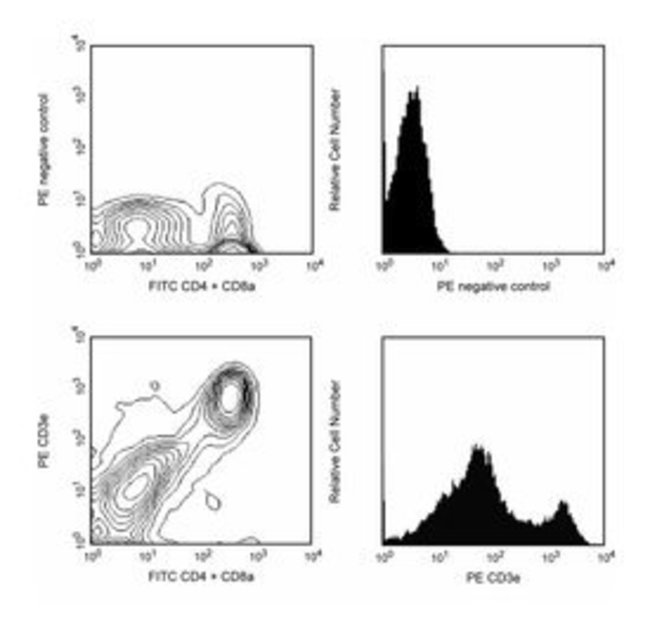CD3ε Hamster anti-Mouse, PE, Clone: 145-2C11, BD, Hamster Monoclonal Antibody, Each

Details:
The 145-2C11 antibody reacts with the 25-kDa ε chain of the T-cell receptor-associated CD3 complex, which is expressed on thymocytes, mature T lymphocytes, and NK-T cells. The cytoplasmic domain of CD3e participates in the signal transduction events which activate several cellular biochemical pathways as a result of antigen recognition. Soluble 145-2C11 antibody can activate either unprimed (naive) or primed (memory/preactivated) T cells in vivo or in vitro, in the presence of Fc receptor-bearing accessory cells. In contrast, plate-bound 145-2C11 can activate T cells in the absence of accessory cells. Soluble 145-2C11 antibody has been reported to induce re-directed lysis of Fc receptor-bearing target cells by CTL clones and can also block lysis of specific target cells by antigen-specific CTL's. Under some conditions, T-cell activation by 145-2C11 antibody has been reported to result in apoptotic cell death. The 145-2C11 antibody does not cross-react with rat leukocytes and it has been reported that pre-incubation of thymus cell suspensions at 37°C for 2-4 hours prior to staining enhances the ability of anti-CD3ε and anti-αβ TCR mAbs to detect the T-cell receptor on immature thymocytes. This antibody is routinely tested by flow cytometric analysis and is compatible with intracellular staining protocols using the BD Cytofix/Cytoperm™ Kit (Cat. No. 554714). Other applications were tested at BD Biosciences Pharmingen during antibody development only or reported in the literature.Host Species: HamsterClone: 145-2C11Isotype: IgG1 κSpecies Reactivity: MouseImmunogen: H-2Kb specific cytotoxic T lymphocyte clone BM10-37Flow Cytometry, Intracellular Staining
Additional Information
| SKU | 10133348 |
|---|---|
| UOM | Each |
| UNSPSC | 12352203 |
| Manufacturer Part Number | 553064 |
